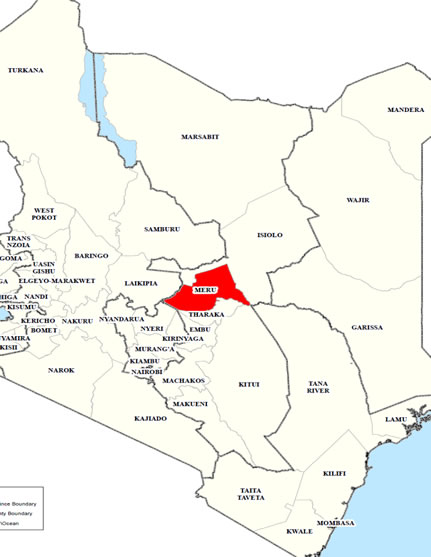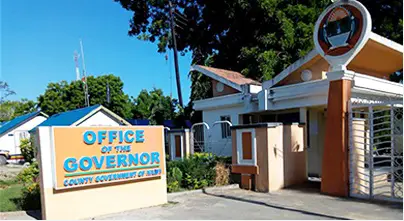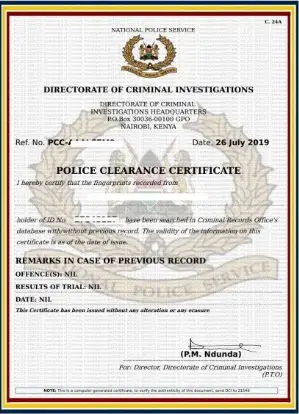Get ready to explore the beautiful landscapes and vibrant culture of Meru County. Located in the heart of Kenya, this stunning region is home to breathtaking mountains, lush forests, and an array of fascinating wildlife. With its rich history and warm hospitality, Meru County offers an unforgettable experience for nature lovers, adventure enthusiasts, and those looking to immerse themselves in the traditions of the local Meru people. Whether you’re seeking a thrilling safari, a serene escape into nature, or a captivating cultural experience, Meru County has it all. Discover the wonders waiting for you in this enchanting corner of Kenya.
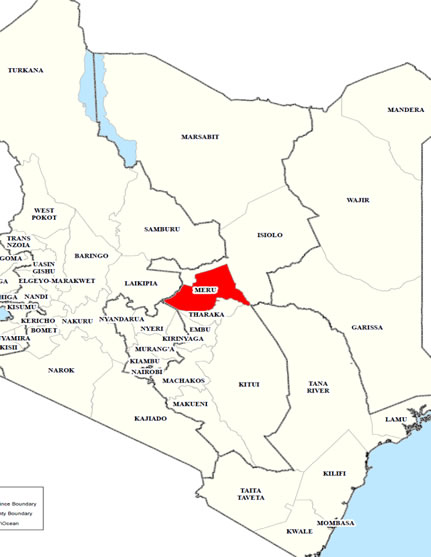
This image is property of meru.go.ke.
Geography
Location
Meru County is located in the eastern part of Kenya, bordering Tharaka Nithi, Isiolo, Laikipia, Nyeri, and Kirinyaga counties. It lies on the eastern slopes of Mount Kenya and covers an area of approximately 6,936 square kilometers. The county’s central location makes it easily accessible from Nairobi, the capital city of Kenya, as well as other major towns in the region.
Climate
Meru County experiences a pleasant climate throughout the year due to its proximity to the equator. The region has a temperate climate with average temperatures ranging from 20 to 25 degrees Celsius. The county receives two rainy seasons, with the long rains occurring between March and June, and the short rains between October and December. These rainfall patterns support diverse agricultural activities and contribute to the region’s lush vegetation.
Natural features
Meru County showcases a wide variety of natural features, making it a fascinating destination for nature lovers. One of the most prominent features is Mount Kenya, Africa’s second-highest peak, which lies within the county’s boundaries. The mountain offers opportunities for hiking, climbing, and exploration of its breathtaking glaciers, lakes, and wildlife. Additionally, the county is home to several rivers, including the Tana River, which provides water for irrigation and hydroelectric power generation. The county’s landscape is further enriched by rolling hills, fertile farmlands, and expansive forests, showcasing the region’s natural beauty.
History
Early settlement
Meru County has a rich history that dates back centuries. The region was inhabited by indigenous communities, including the Meru people, who are the predominant ethnic group in the area. These communities lived in small settlements and practiced subsistence farming, rearing livestock, and engaging in trade along the trade routes that passed through the region. The communities developed vibrant cultural practices and social systems, laying the foundation for the county’s identity.
Colonial era
During the colonial era, Meru County, like the rest of Kenya, fell under British rule. The region experienced significant changes during this period, including the introduction of cash crops such as coffee and tea, which replaced traditional subsistence farming. The British administration also brought infrastructure development, including roads and schools, which had a lasting impact on the county’s development.
Post-independence
After Kenya gained independence in 1963, Meru County became part of the newly-formed Republic of Kenya. The county continued to develop, with a focus on expanding education, healthcare, and infrastructure. The region witnessed significant population growth and economic development, becoming a vital contributor to Kenya’s progress.
Government and Administration
Political leadership
Meru County is led by an elected Governor, who is the head of the county government. The current Governor is Hon. Kiraitu Murungi, who assumed office after the 2017 general elections. The Governor works closely with other elected county officials and a team of professionals to ensure the efficient governance and provision of services to the residents of Meru County.
Administrative divisions
For administrative purposes, Meru County is divided into seven constituencies, namely Imenti North, Imenti Central, Imenti South, Tigania East, Tigania West, North Imenti, and Buuri. These divisions help in the distribution of county services and facilitate effective governance at the grassroots level.
County services
Meru County is committed to providing essential services to its residents. The county government focuses on delivering healthcare, education, infrastructure development, agriculture support, and social welfare programs. Efforts are also being made to boost the local economy through investments in industries, tourism promotion, and empowering small-scale businesses.
Economy
Agriculture
Agriculture plays a central role in Meru County’s economy. The region’s fertile soils support the production of various cash and food crops, including coffee, tea, bananas, maize, beans, and dairy farming. The county has established cooperatives and agricultural extension services to support farmers, enhance productivity, and promote sustainable farming practices. The agricultural sector contributes significantly to both domestic and international markets, generating income and employment opportunities for the local population.
Tourism
Meru County is a hidden gem when it comes to tourism in Kenya. Its diverse natural features, including Mount Kenya, national parks, and reserves, make it an attractive destination for nature enthusiasts and wildlife lovers. Meru National Park, located in the county, boasts an abundance of wildlife, including elephants, lions, leopards, and various bird species. The park offers game drives, nature walks, and camping experiences, allowing visitors to immerse themselves in the beauty of the African wilderness. Additionally, the county has historical sites such as Timau Fort and Njuri Ncheke shrines, offering a glimpse into its rich cultural heritage.
Manufacturing
Meru County has seen an increase in manufacturing activities in recent years. The county’s strategic location, availability of raw materials, and a skilled workforce have attracted investors in various sectors, including food processing, textiles, and construction materials. The manufacturing sector has the potential to create employment opportunities and stimulate economic growth while diversifying the county’s revenue streams.

This image is property of dynamic-media-cdn.tripadvisor.com.
Infrastructure
Transportation
Meru County has a well-developed road network connecting it to other parts of Kenya. Major highways, including the Nairobi-Meru Highway and the Thika-Embu-Meru Highway, provide easy access for both commuters and cargo transportation. The county government is also working on improving feeder roads within the county to enhance connectivity to rural areas. There are public transportation systems, including buses and matatus, ensuring convenient movement within the county.
Communication
Meru County is well-connected in terms of communication infrastructure. Mobile networks cover a significant part of the county, providing reliable communication services. Internet connectivity, both wired and wireless, is available in urban centers, facilitating efficient communication, business operations, and access to information. Additionally, the county has postal services and a network of telecommunication service providers, ensuring seamless connectivity.
Healthcare
Meru County is committed to providing quality healthcare services to its residents. The county has several health facilities, including hospitals, health centers, and dispensaries, catering to both urban and rural areas. The county government is focused on improving infrastructure, equipping medical facilities, and training healthcare professionals to enhance healthcare delivery. Efforts are also being made to promote preventive healthcare measures and increase access to specialized medical services.
Education
Education is highly valued in Meru County, and the county government has made significant investments in the sector. The county has a robust education system, comprising pre-primary, primary, secondary, and tertiary institutions. The county government works closely with the national government to improve infrastructure, provide teaching resources, and support the professional development of teachers. Education opportunities have been expanded to reach marginalized areas, ensuring access to quality education for all children in the county.
Culture and Traditions
Language
The Meru people, the predominant ethnic group in the county, have their own language known as “Kimeru.” Kimeru is widely spoken in Meru County, acting as a unifying factor among community members. Swahili and English are also commonly spoken, particularly in formal settings, facilitating communication with people from diverse backgrounds.
Religion
Religion plays a significant role in the lives of the residents of Meru County. Christianity is the dominant religion, with various denominations having a strong presence in the region. The Meru people also maintain their traditional religious beliefs and practices, which are deeply rooted in their culture. They believe in a supreme being and ancestral spirits and perform rituals and ceremonies to honor them.
Festivals
Meru County is known for its vibrant festivals and cultural celebrations. One such festival is the “Njuri Ncheke,” which is a gathering of the council of elders representing the Meru community. During this festival, important cultural and traditional matters are discussed, and decisions are made to guide the community’s welfare. The “Mwongozo” festival is another significant cultural celebration, featuring traditional music, dance, and storytelling, showcasing the rich heritage of the Meru people.
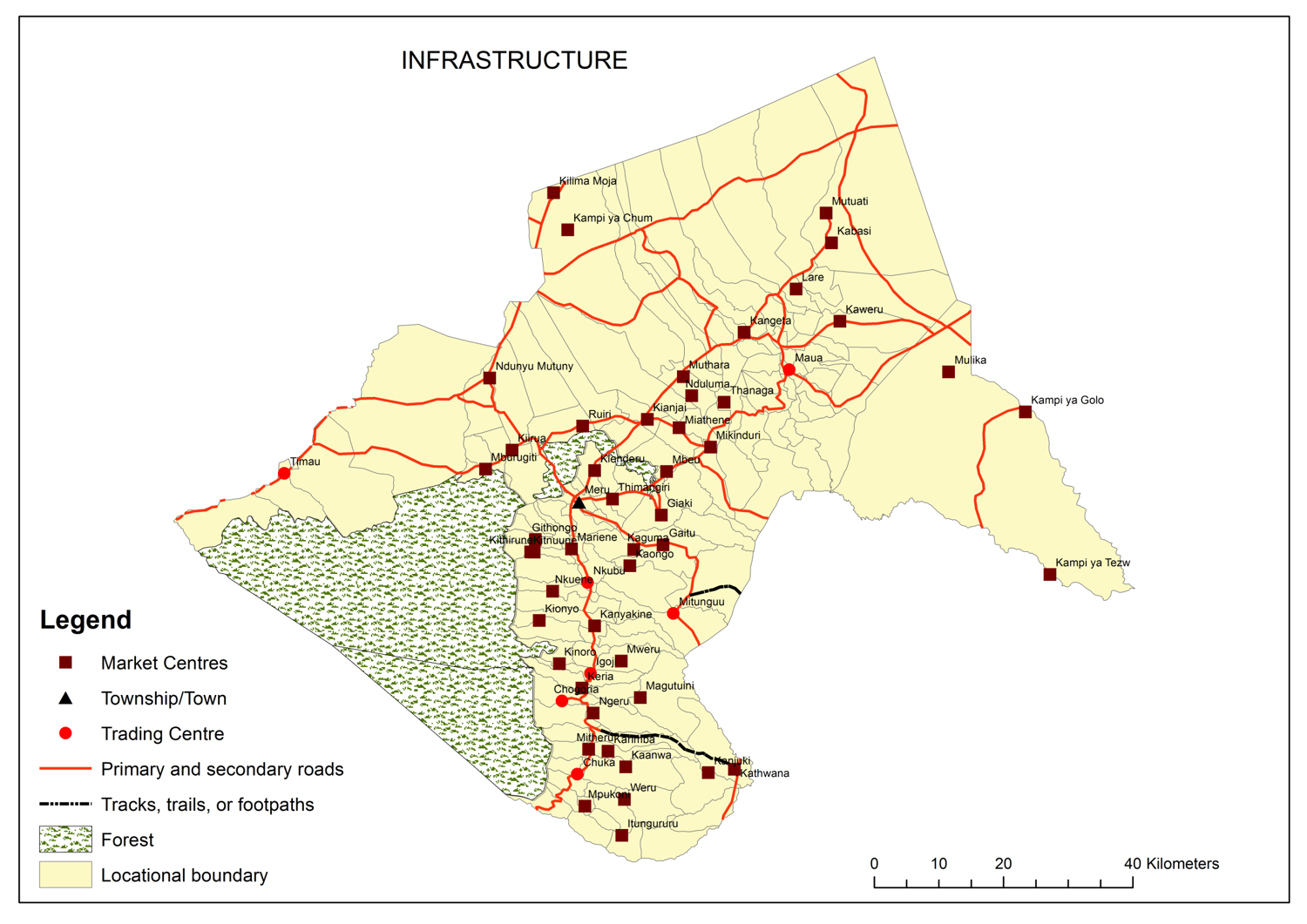
This image is property of meru.go.ke.
Tourism
National parks and reserves
Meru County boasts several national parks and reserves, making it a paradise for wildlife enthusiasts. Meru National Park, one of Kenya’s oldest national parks, is a haven for various wildlife species, including elephants, buffalos, giraffes, zebras, and crocodiles. The park offers game drives and guided walks, allowing visitors to experience close encounters with these magnificent creatures. Other reserves in the county, such as Mwingi National Reserve and Maua Game Sanctuary, offer exceptional experiences for nature lovers and bird watchers.
Historical sites
Meru County is home to numerous historical sites that showcase its rich cultural heritage. Timau Fort, built by the British during the colonial era, stands as a reminder of Kenya’s struggle for independence. The fort has been preserved and allows visitors to learn about the history and significance of this landmark. The Njuri Ncheke shrines, where important cultural ceremonies and rituals take place, provide insight into the county’s traditional governance structures and customs. These historical sites offer a unique glimpse into the past and contribute to the county’s tourism appeal.
Social Services
Healthcare
Meru County is committed to providing accessible and affordable healthcare services to its residents. The county government has invested in healthcare infrastructure, equipped medical facilities, and recruited healthcare professionals to ensure quality service delivery. Through partnerships with national and international organizations, the county implements programs focused on preventive care, maternal and child health, and the management of communicable and non-communicable diseases. The ultimate goal is to improve the health and well-being of the county’s population.
Education
Education is a key priority for Meru County’s social development. The county government works closely with the national government to improve the quality of education, enhance infrastructure, provide teaching resources, and promote continuous professional development for teachers. Efforts are made to ensure equitable access to education for all children within the county, including those in marginalized areas. The county recognizes the vital role of education in empowering individuals and fostering socio-economic growth.
Social welfare
Meru County is committed to addressing the social welfare needs of its residents. The county government has established programs and initiatives aimed at poverty reduction, youth empowerment, gender equality, and support for vulnerable groups. These initiatives include skills training, access to affordable housing, provision of clean water and sanitation, and support for entrepreneurs. The county collaborates with development partners and non-governmental organizations to implement these programs effectively and make a positive impact on the lives of its residents.
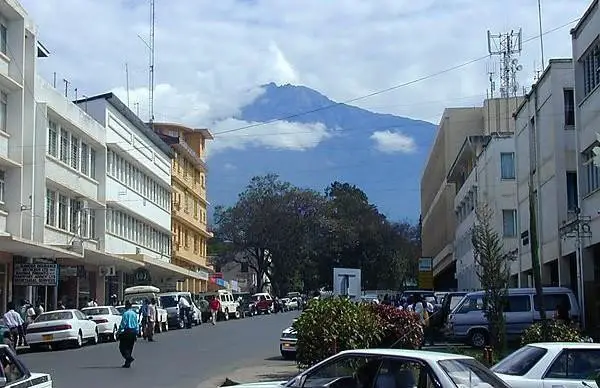
This image is property of www.shadowsofafrica.com.
Demographics
Population
Meru County has a diverse population, with various ethnic groups residing within its borders. According to recent estimates, the county has a population of over 1.5 million people. The Meru people, who are Bantu-speaking, form the majority ethnic group. Other significant ethnic groups include the Embu, Kikuyu, Borana, Somali, and Turkana communities. The diversity of the population contributes to the county’s vibrant culture and a dynamic social fabric.
Ethnic groups
The Meru people, who are the largest ethnic group in the county, have a rich cultural heritage and traditions. They have a matrilineal system of inheritance, with family ties and kinship playing a vital role in their social structure. Other ethnic groups, such as the Embu and Kikuyu, have their unique customs and traditions, adding to the county’s cultural diversity. Interactions among these ethnic groups have led to the fusion of different cultural practices, fostering social cohesion and unity.
Languages spoken
The predominant language spoken in Meru County is Kimeru, which belongs to the Bantu language family. Kimeru serves as the primary means of communication among the Meru people and acts as an important cultural identifier. Swahili and English are also widely spoken, serving as lingua francas for communication with individuals from diverse ethnic backgrounds. These languages facilitate interaction and foster understanding among the county’s residents.
Tourist Attractions
Mount Kenya
Meru County is privileged to be home to Mount Kenya, the second-highest peak in Africa. Mount Kenya attracts adventurous climbers, hikers, and nature enthusiasts from around the world. The mountain offers various routes for climbers, each showcasing breathtaking views and unique ecosystems. The surrounding flora and fauna, including rare plant species and wildlife such as colobus monkeys and hyrax, create an enchanting experience. For those not inclined to climb, Mount Kenya offers opportunities for nature walks, bird watching, or simply enjoying the awe-inspiring scenery.
Three Trout Fly Fishing
Meru County is a haven for fishing enthusiasts, particularly those passionate about fly fishing. Three Trout Fly Fishing is a popular destination within the county, known for its pristine rivers and abundant trout populations. The scenic rivers provide the perfect setting for anglers seeking a memorable fishing experience. Whether you are an experienced fly fisher or a beginner, the rivers of Meru County offer ample opportunities to cast your line and catch some trout while immersing yourself in the tranquility of nature.
Meru National Park
Meru National Park is undoubtedly one of Meru County’s most impressive tourist attractions. The park spans over 800 square kilometers and offers an exceptional wildlife viewing experience. Visitors have the chance to spot the “Big Five” (elephant, lion, leopard, buffalo, and rhinoceros) and other iconic African species roaming in their natural habitat. Meru National Park also boasts diverse landscapes, including savannah grasslands, riverine forests, and swamps, providing unique ecosystems for wildlife conservation. Game drives, guided walks, and camping opportunities allow visitors to explore and appreciate the park’s incredible biodiversity.
In conclusion, Meru County in Kenya offers a wide range of attractions and experiences, from its stunning natural features to its rich cultural heritage. The county’s geographic location, pleasant climate, and diverse resources contribute to its appeal as a tourist destination. Whether you are interested in adventure, wildlife, or immersing yourself in local culture, Meru County has something to offer. The county government’s commitment to infrastructure development, social services, and economic growth further enhances the quality of life for both residents and visitors. Plan your visit to Meru County and discover the treasures this hidden gem has to offer.
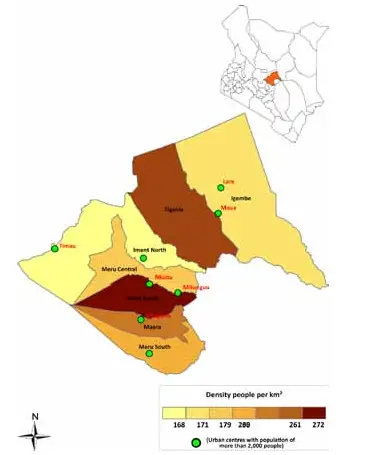
This image is property of opencounty.org.

